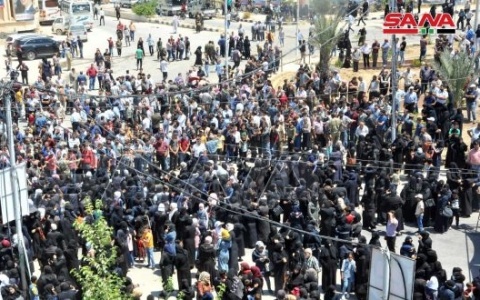People gather at Municipal Square in Douma, Syria, hoping to welcome freed detainees, June 5, 2021
The families and friends of the detainees gathered in Douma on June 5, hoping for reunions with some of the 10,000s of prisoners who had avoided execution or death from poor conditions at the hands of Syria’s Assad regime.
Among more than 10,000 in the square, some had waited for news for almost a decade, amid the mass detentions seeking to crush the Syrian uprising of March 2011.
On May 26, casting his vote in the staged Presidential election, Bashar al-Assad promised to free those “without blood on their hands”. The statement was an attempt to proclaim regime authority: it was made in Douma, near the capital Damascus, where Russia and Assad’s forces had used chemical and conventional weapons to force the surrender of anti-Assad groups in April 2018.
Still, the families and friends gathered, hoping there might be some substance to Assad’s declaration. Wafiqa al-Shami, who had presumed her husband dead after he was seized in February 2012, told Syria Direct, “My hopes were roused by the news that came out about the possibility of 10 buses arriving, carrying the city’s released, and detainees who had been [counted] among the dead before that.”
Those hopes were dashed. Shami explained, “[We] were shocked by the arrival of a single bus. May God break their hearts. They broke my heart and the hearts of many women like me.”
Only 26 men had returned.
The scene would be repeated throughout towns near Damascus: five detainees from Arbin, and then a total of 32 on June 19, including nine from Saqba, eight from Kafr Batna, and one from Zamalka.
Human rights activist Thaer Hijazi calculated that only 64 out of at least 6,555 were freed.
In March, a report from the Syrian Network for Human Rights documented the detention and disappearance of 149,361 people — 131,106 of them at the hands of the regime — including 4,924 children and 9,264 women, in the previous decade.
Promise Betrayed
During the staged election, regime officials told residents to show loyalty to Assad. In return, loved ones would be freed.
The residents upheld their side of the bargain on June 5, holding up pictures of Assad and chanting slogans of support. They did so, near the sites where thousands of people were killed or injured during the Russia-regime offensive of spring 2018. They were only 1.5 km (1 mile) from the building where 43 civilians were slain in a chlorine attack, the day before Douma’s surrender.
Yesterday the #Assad admin. announced in Douma about releasing detainees. Families/Relatives gathered to be shocked about only 26 detainees of thousands with Assad portrait in hand. The Mukhabarat prevented the reunion until praising #Assad's blood crowning in a celebration-tent. pic.twitter.com/KzWVz2Bgsq
— Mohamed Al Neser (النسر) (@M_Alneser) June 6, 2021
For a few in the Douma square, there was joy.
Ammar Haider, former detainee in Assad’s prisons, finally meets his daughter. Such an emotional reunion ❤️ https://t.co/pXNSllDINK
— Mazen Hassoun (@HassounMazen) June 22, 2021
But that night, after hours of waiting, almost all the others were rewarded with an empty journey to their homes.
Wafiqa al-Shami said that the day had been equivalent to her heartbreak through “years of my husband’s detention.
She had gotten used to life “without a husband, with the burden of supporting my children”, but now the feelings of loss “came back, as though it happened yesterday”.

